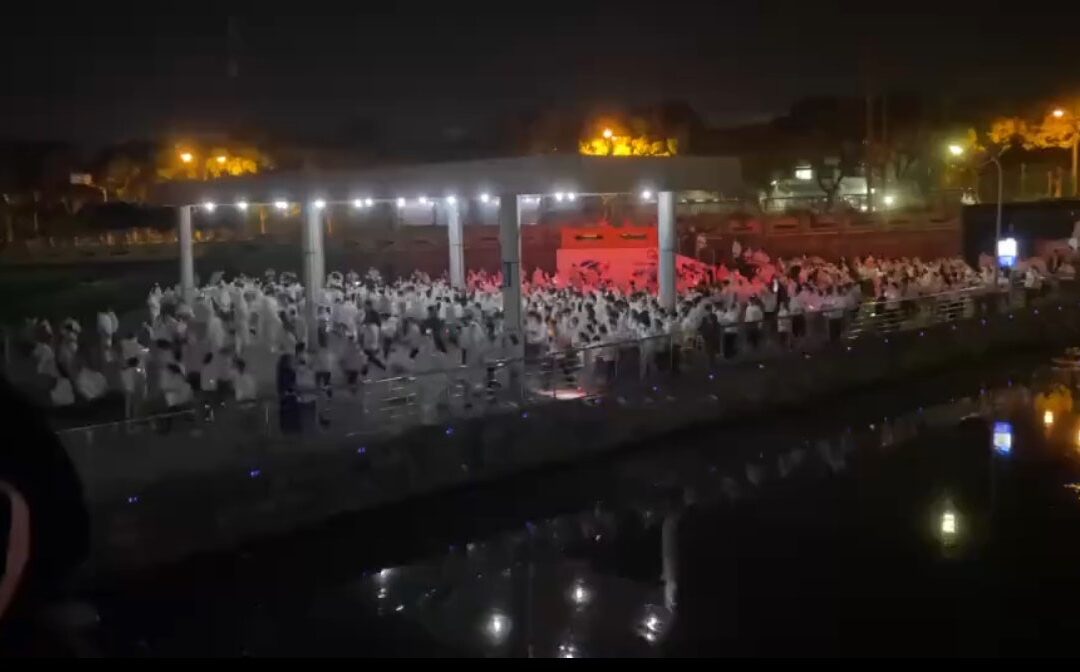This post is the sixth in a series of periodic summaries of highlights from Chinese-language news and social media, offering some analysis of economic trends and the changing character of class struggle in China. Through these posts, we hope to give English readers a broader sample of the discussions taking place across the linguistic and digital divide. In addition, we recommend a few recent English-language publications at the end. (If you notice mistakes or any important story that we missed, please contact as chuangcn@riseup.net and we can add it to next month’s post.)
Highlights from Chinese News and Social Media, May-June 2022
Week 1 of May
White Terror against Internationalist Noise
In Shanghai, groups of white-clad police wearing sunglasses in the dark knocked on apartment doors and took people away for threats and interrogation, allegedly for participating in noise demos demanding food and other supplies the week before. In one case whose video went viral on May 5, police told a couple they needed to take away the man for allegedly playing the Internationale, apparently during demos the previous week when that old anthem of the international communist movement (along “Do You Hear the People Sing” and the sounds of pots banging) was used as expression of anger with the Shanghai lockdown. Commenters on Weibo debated how the Internationale could become sensitive in “Socialist China,” and one pointed out that the first line, “Arise ye starvelings from your slumber,” (起来饥寒交迫的努力) was clearly trying to incite something. Another asked whether the national anthem would be next, considering that it opens with the line, “Arise ye who will not be slaves!” (起来不愿做奴隶的人们).
A video from the day before showed 7 cops taking away a juvenile boy for allegedly posting about pot-banging protests demanding supplies. The poster commented, “Shanghai lacks everything but cops.”
On May 6 the internet police responded (through an “internet security” company) with an explanation of when it’s ok to play the Internationale and when it’s not.
Communist Youth League Blames the Gays for COVID Outbreak
Meanwhile in Beijing — on Youth Day (the anniversary of the May Fourth movement), no less — the Communist Youth League’s local newspaper blamed the covid outbreak there on gay men having sex in public toilets.
Workers Riot at Quanta Factory in Shanghai
Hundreds of workers riot & clash with guards at Quanta factory in Shanghai (which makes MacBook Pro) the night of May 5-6 when refused entry into dorms, over 100 jumping the gate. Recorded on video & confirmed by Quanta. Short-lived (quashed a few hours later) but largest industrial action in years.
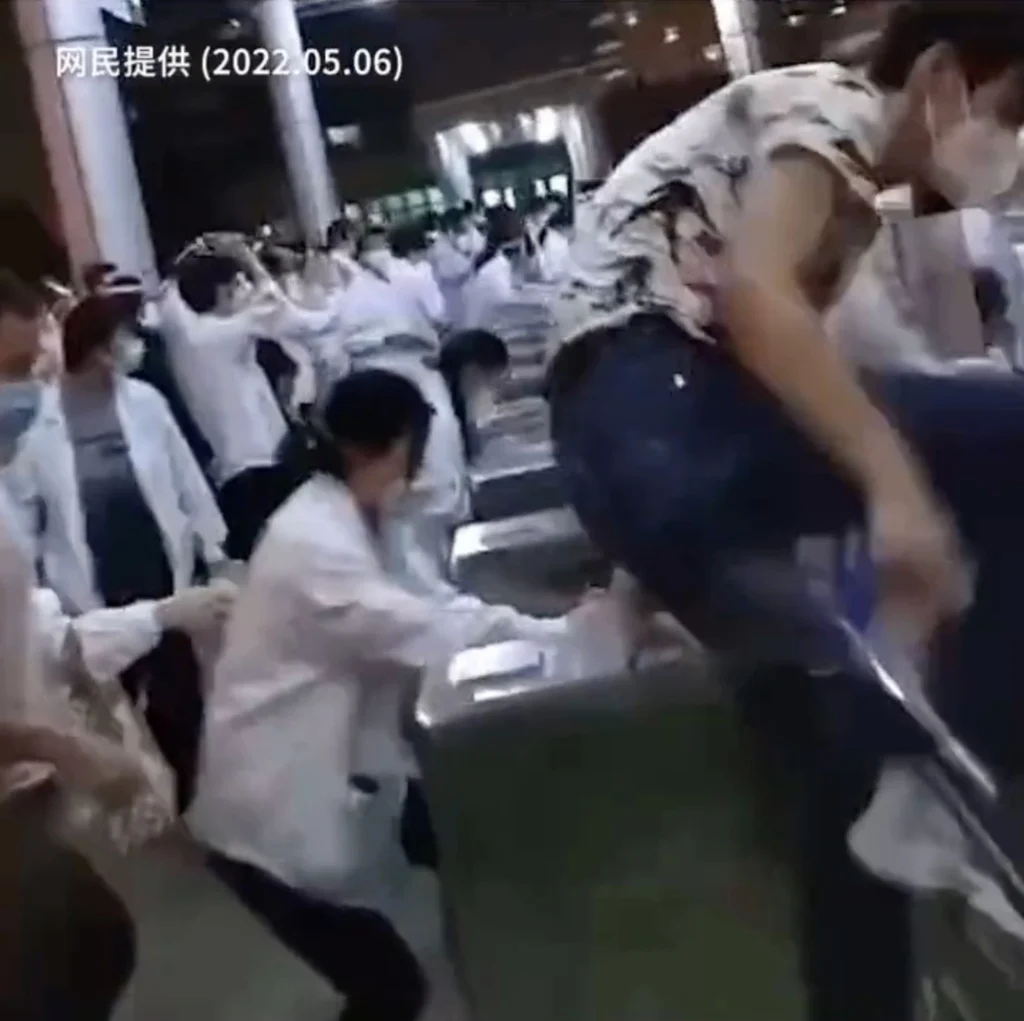
The factory also produces for Tesla, according to a report on HK01.1
Collective Resistance to White Guards in Shanghai
On May 7, videos circulated of dozens of Shanghai residents attacking smaller groups of “Big Whites” (大白), also known as “White Guards” (白卫兵, in reference to the Red Guards of the Cultural Revolution), so-called “volunteers,” usually referring to migrant workers paid by the state to enforce pandemic-control policies. Some of the videos were traced to Jinsheng residential complex on Yindu Road in Zhuanqiao Township (颛桥镇银都路金盛小区). One explanation claimed that the altercation began when the White Guards assaulted several teenagers who had been yelling demands for supplies such as food (“发物资, distribute the supplies!”—the most common slogan of protests in locked down cities such as Shanghai over the past few months). When other residents witnessed the assault, the story goes, dozens of them chased the White Guards out of the building and broke open the iron gates that had been imprisoning them inside the complex. What happened after this is less clear.2 State media confirmed that something like this happened in its own report, of course condemning the rioters for “picking quarrels” (滋事), but leaving the details vague.
Week 2 of May
Popular dark humor about restrictions on travel overseas
As many young netizens, who had been hoping to flee overseas as soon as possible, discover that the state has made it much more difficult for Chinese citizens to leave the country, some research how to cross the Himalayas into Nepal (as Tibetan refugees had been doing since the 1950s), only to find that a “quarantine border” has been set up on Mt. Everest.
English report:
China restricts overseas travel, ostensibly to keep COVID at bay
‘China will “strictly limit” its citizens from traveling outside the country for “non-essential” reasons, the National Immigration Administration (NIA) said in a statement on Thursday…. China tightened scrutiny over issuing and renewing passports to stop “non-urgent and unnecessary” cross-border travel last July, and issued only 335,000 passports in the first half of 2021 — a measly 2% of the total for the same period in 2019…. Rumors that authorities have clipped passports to prevent people from traveling have swirled on social media, after some passengers arriving in Guangzhou aboard a flight from Bangkok posted online.’ (SupChina, May 12)
Highly profitable covid vaccine company suddenly implements massive layoffs prior to distributing bonuses
净利超800亿:北京科兴中维被曝发年终奖前大量裁员 什么原因?
Week 3 of May
Economic data point downward as officials scramble to make it look as if they are doing something about it
Consumption figures for April dropped significantly, according to National Bureau of Statistics data released on 16 May. The bureau blamed Covid19, and said consumption would rebound after outbreaks were brought under control. Total sales in retail goods fell by 11.1 percent over last year’s levels, following a fall of 3 percent in March over the previous year.
Official unemployment numbers also hit 6.1 percent, the highest government number since 6.2 percent in February 2020 at the start of the pandemic.
Industrial output also fell for the first time since March 2020, down 2.9 percent in April over a year ago.
Just one week before the figures were released, Li Keqiang said, “The current employment situation is complex and severe,” adding that “all regions and departments should follow the guidance of Xi Jinping Thought on Socialism with Chinese Characteristics for a New Era, conscientiously implement the decisions and arrangements of the CPC Central Committee and the State Council, increase the implementation of the employment priority policy, and maintain stable employment and stable economic operation.” This mangled mess of party jargon translates into a total of 2.5 trillion yuan (US $400 billion) in tax breaks for businesses, with barely a word about the plight of workers. Li said workers would be able to take out loans against their government housing provident fund. He also warned of the need to provide jobs for the coming cohort of fresh college grads, who will hit the job market in July. However, Li and the government merely announced that students would be exempt from interest payments on loans for this year and 2022.
Border wall between Shanghai and Zhejiang
Beijing Lockdown
The lockdown began as 13,000 residents of the huge Nanxinyuan complex (who tested negative) were sent to lockdown with 2 hours notice after 26 other residents had tested positive….
Week 4 of May
Bank Protests in Henan – eventually repressed with covid-control mechanisms
Hundreds of account holders of four rural banks in Henan gathered in the provincial capital of Zhengzhou to hold tearful demonstrations outside the banks’ headquarters, protesting the freezing of their accounts. Interviews by with protesters by the South China Morning Post revealed the accounts had been frozen since April 18th. Account holders reportedly had total deposits ranging from 200,000 yuan to over 1.5 million yuan (approx. USD $30,000 – 225,000).
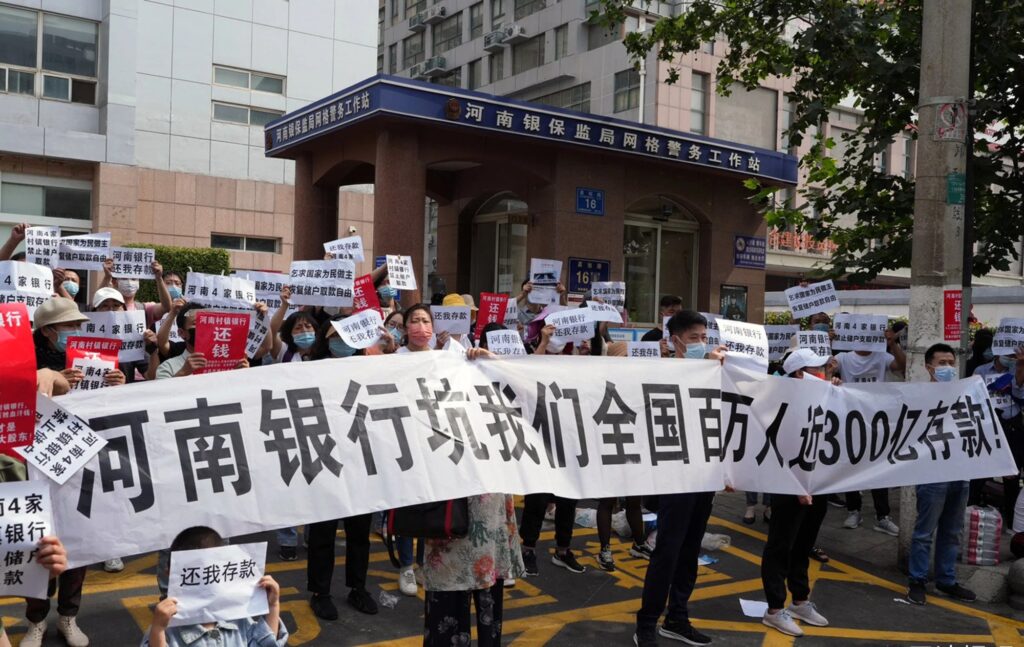
While people across various strata of the Chinese working class have relatively high savings, the high amounts cited suggest that these protestors were relatively well-to-do. Even optimistic calculations estimate that (before the pandemic) the average savings for those in China’s eleven largest cities sat at 100,000 yuan.
Clearly, the trials of the pandemic thus far have hit different strata of the class structure in different ways. Now, after the reemergence of lockdowns this year, coupled with a myriad of other troubles, China’s weakening economy is clearly cutting to the bone for some of China’s more well-to-do workers and small businesses.
Video of the protesters outside a local government banking regulator:
As things continue to unravel, it appears as if the revolts of petty capitalists may become particularly significant, developing in different directions than proletarian responses:
“We are talented people (人才) who returned from abroad to start business in China….. We brought money and talent with us. What we have invested is all the sci-tech talent of Peking University and Tsinghua University, and we brought the money of investors with us. But now we’re being arrested and the money is being taken away….”
And here is one of many sentimental videos complaining about the plight of “small and medium enterprises” over the past three years, in this case focusing on the temptation to give up and “lie flat” (tangping):
By mid-June the state (apparently at the municipal level) had moved from merely arresting protestors to what became the first widely reported use of covid-control mechanisms for the suppression of completely unrelated popular unrest:
Henan Bank Depositors Hit With Red Health Codes
“People who have arrived in Zhengzhou to withdraw money from embattled regional banks said they have found their health codes turn red — a label mostly reserved for potential COVID-19 carriers or those infected with the virus — after arriving in Henan province’s provincial capital, prohibiting them from accessing transportation networks, public services, and even going to the banks to lodge their grievances.” (Sixth Tone, June 14)
Fears of data abuse as Chinese health code turns red for financial scandal protesters
“Victims of what could be one of China’s largest financial scandals found themselves unable to step outside to join planned protests because their health QR codes had turned red, reigniting fears that the large-scale data collected for contact tracing would be abused for other uses.” (SCMP, June 14)
“That cop killed someone, don’t let him get away”
A police officer in the Beibei district of Chongqing shot and killed a man after allegedly responding to a street altercation on May 30. A short report in official media the following morning said that an investigation was underway. The report said the 49 year old victim, surnamed Weng, and his wife, surnamed Chen, were “dissatisfied with the officer’s handling [of the altercation] and attacked the officer.” The officer fired his gun at Weng, who was later declared dead in the hospital.
Video scraped from social media showed outraged onlookers yelling at the cops, as Weng received CPR in a pool of his own blood. A woman, likely Chen, is seen tussling with officers, and she is eventually taken away by police. A voice in the video can be heard saying “That cop killed someone, don’t let him get away!”
Images from social media showed a women in tears, likely Chen, holding the an officer by the belt, likely the one who killed Weng, preventing him from fleeing the scene as locals attended to the dying man.
Clearly, those on the scene had disdain for the cops, though online, as the incident rose to the Weibo top ten list, social media algorithms promoted posts that supported the police, even while comment sections remained more critical. In one popular post of a video of the aftermath, top comments from netizens included: “These onlookers make me really sad about the quality of our citizens. Could you be a bit more reasonable? Clearly it seems to be the police’s fault, but they didn’t go figure out what was going on.” Another reads: “How tragic. The head of a family gone. How will this family go on in the future?”
Economic stimulus for the wealthy
It’s worth noting that even in the increasingly gloomy economic environment, policy makers consistently make tiny adjustments, with minor effects, directed at specific industries, with a clear preference for tax breaks and subsidies to business rather than cash handouts or other assistance for workers.
In Shanghai, for example, the municipal government marched out 50 measures to help support the economy, after two months of crippling lockdowns. Unsurprisingly, the majority of measures offered (tepid) support for business owners and the rich, rather than for the average worker. The measures included pushing back the deadline for filing tax returns by one month, and elevating a cap on the number of license plates issued in the city by 40,000 for the year. Businesses were also given subsidies of 600 yuan ($90 USD) for each worker if they “did not lay off, or laid off few workers.”
At the national level, other similarly useless measures were announced at the end of the month. On the 31st of May, the government announced it would cut taxes on the purchase of new cars by half, for a narrow category of small passenger vehicles. The measures, they claimed, would help stimulate consumption and boost flagging auto sales. The government had projected in mid-May that annual vehicle sales would fall by five percent (relative to 2021), down to 19 million vehicles. The tax breaks were projected to boost sales by 2 million cars.
Of course, tax breaks on car sales do absolutely nothing for the vast majority of China’s working population, who have never been able to afford cars. There are 180 cars per 1000 people in China, according to official figures, compared to 800 per 1000 in the United States. Suffice it to say that these and other government measures suggest a lack of willingness or ability to help anyone other than business and the rich. Moreover, even these policies for the rich do not seem to have been particularly effective.
Meanwhile, on 27 May, the city of Beijing announced an increase in its monthly “Minimum Livelihood Guarantee” (dibao 低保)payments from 1,245 yuan ($187 USD) per person to 1,320 yuan ($198 USD), a meagre raise of six percent, citing the pandemic as a reason.
“Grain Security,” i.e. moderate limits to soaring grain prices amid fears of global shortage
Xi Jinping has been emphasizing “grain security” this year, one point of which is that domestic arable land should be preserved to the extent that China could rely less on grain imports. While the leadership is keen to keep farmers growing grain for human consumption, the farmers seem to have other preferences.
This May the Ministry of Agriculture and Rural Affairs published a notice, banning farmers from growing grain to be sold as feed for livestock, which seems reasonable enough given that the price of feed is currently higher than grain for human consumption. But this also demonstrates that farmers’ well-being could simply fall behind if they are grain-only farmers, according to one expert: “a high price of wheat would have a negative impact on all of China’s 1.4 billion consumers.” If a higher price is not an option, then what can be done? This expert suggests “more subsidies” and “lower costs” through further modernization of agriculture, but the global history of agricultural modernization casts doubt on such a fix.
In English, see:
War and weather sent food prices soaring. Now, China’s harvest is uncertain
‘China’s winter wheat harvest next month is one of the big uncertainties in a global economy already struggling with high commodity prices, particularly in regions heavily dependent on crops from Russia and Ukraine. If the Chinese harvest is bad in the coming weeks, it could drive food prices up further, compounding hunger and poverty in the world’s poorest countries…. China’s agriculture minister, Tang Renjian, stirred international concern in early March when he said the wheat crop would be the worst on record because of the deluge in the fall. Other agriculture ministry officials have issued warnings, although not quite as downbeat.” (NYT via Indian Express, May 12)
Heavy floods damage crops in China, leading to concerns over food shortage
‘Large swathes of crops including paddy have been destroyed by heavy floods in China, leading to further challenges to food security. The authorities have warned of more rains in the coming days. The Russia-Ukraine war has already led to food shortages pushing global prices. Food imports could only rise for the world’s second-largest economy, which is battling several other economic challenges.’ (Business Standard, June 20)
Week 1 of June
Official report on rise of juvenile delinquency
A white paper released on June 1, Children’s Day in China, showed a large increase in crimes committed by minors last year, in a return to levels not seen since 2014. Chinese authorities arrested 55,379 minors in 2021, a 47 percent rise over 2020, and 15 percent more than in the pre-pandemic year of 2019, according to the white paper released by the Supreme People’s Procuratorate, China’s public prosecutor. A previous white paper released by the Procuratorate shows that arrests have not been at this level since 2014, when 56,276 minors were arrested. In 2021, theft was the top crime among minors, with 25.8 percent of the cases, while “fighting in groups” (聚众斗殴罪) came in second with 12.2 percent.
The term “arrest” is misleading, however, and the number of youth apprehended by the state is surely much higher. Suspected criminals are first detained by police, and can be held for several weeks before the state decides whether to formally “arrested” the individual (for more, see this 2014 WSJ introduction of China’s police powers by legal scholar Stanley Lubman). For comparison, in 2019, 696,620 minors were arrested in the United States, according to statistics from the US Justice Department.
While these figures are a clear indicator in the rise of crime by minors, the question of the underlying causes remains open. Higher youth crime, especially when the stealing of material goods is so prevalent, could be linked to the economic stress of the pandemic. The white paper itself made no such claims, though the white paper insinuated that cybercrimes were central, though this category only increased by some 1500 cases from 2019 to 2021, not nearly enough to explain the total uptick of more than 7000 cases between those two years.
Celebrity censored over tank-shaped cake
Li Jiaqi, a celebrity famous for selling cosmetics online, got banned from the Chinese internet on June 3rd after a cake shaped like a tank appeared in his livestream. While it seems silly to test censorship around a such a sensitive day, it is reasonable to conjecture that Li simply didn’t know why June 4th should matter at all. While his personal income was hurt, the incident created an opportunity for his fans to learn why censors care about this day. Once again the bureaucrats create a rupture by their own hands in this seemingly tight apparatus.

Week 2 of June
Young Employee Stabs Her Manager and Watches Her Die
On June 9th, Meng Dexin, a 27-year-old employee from China Unicom’s Beijing Office, killed her manager Luo Hanxiao (age 31) in a meeting room. It is said that Meng’s actions must have been quick and calm, since her colleagues just next door couldn’t hear anything suspicious.

The specific motive seems a bit trivial, although many of us may have fantasized about doing something similar from time to time: Luo had fined Meng for clocking in late, although Luo regularly clocked in late herself. Screenshots said to be from Meng’s wall (朋友圈) on WeChat record her thoughts earlier that day:
“Reported others for being late while you can’t even clock in on time yourself 🙄 … Reported me for absence from work, paycheck [reduced to] 1600 [yuan]. I wonder who’s supporting Luo…”
“Luo Hanxiao is a basic bitch (没教养的狗). Why should I lower myself to her standards? 🤮🤮”
While we may never know if anyone was supporting Luo to be an unfair manager, the worrying conditions for Chinese employees tend to be harsh, since enterprises are struggling to reduce their costs as much as possible amid the continued economic slowdown and low rate of profit—only exacerbated by the pandemic. Some may choose to leave their posts or demand justice for unfair treatment, while some may choose the quickest way to end it.
Tangshan Women Assaulted For Refusing Advances
On June 10th in Tangshan, Hebei province two women were assaulted in a barbeque restaurant by a group of men after rejecting their harassment. Although all suspects were arrested the next day, observers, including official media, found the police response problematic when details of the incident emerged.
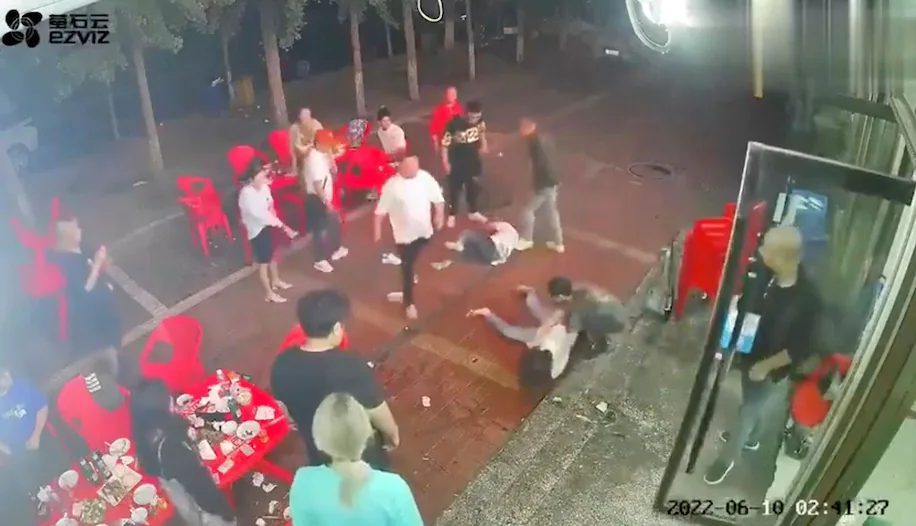
First, an official statement that it took the local police 23 minutes to reach the restaurant, while the local police station had stated that it only took 5 minutes. People were quick to conjecture about connections between local police and criminal organizations, which proved to be true as more similar cases were exposed, such as one in which a woman had posted a video about her being beaten by a Tangshan bar owner before local police demanded that she delete it. In another incident, the owner of a steel plant assaulted another police station in Inner Mongolia, but Tangshan police still haven’t concluded the investigation after 11 years.
Second, the state apparatus was quick to suppress any meaningful questioning from below. Journalists were kicked out when they reached the local train station. The hospital admitting the two survivors was in strict vigilance, with even flowers being searched—echoing the situation in Feng County, Jiangsu, where journalists and others attempting to visit the “chained woman” there were turned away in February. Related posts and keywords were censored on Weibo.
Official media narratives were quick to turn the incident away from discussion of violence against women, turning the focus instead into an issue of gang violence.
Violent acts against women are unfortunately extremely common in China, as they are in nearly every part of the world today, and particularly flagrant incidents continue to make headlines. On June 29th, a man struck and killed with his wife with car outside a government building in the city of Linxiang, in Hunan province. The two were unhappily married and lived separately for years, according to the testimony the wife’s cousin, a woman surnamed Huang, who spoke to media. Huang’s said the man had tricked the his wife to come to the Ministry of Civil Affairs to complete divorce proceedings. But divorce could not be completed due to complications with the husband’s household registration. The man was captured on video outside the government office, running over his wife twice with his car. She was rushed to the hospital, where she was soon pronounced dead.
Later, on June 30, a whistleblower in the case was labeled “criminally insane” and detained by police.
Week 3 of June
Worker deaths soar during “Workplace Safety Month”
China’s “Workplace Safety Month” of June could not have passed in a more embarrassing way, as deadly workplace accidents made headlines across the country. In early June, Chinese authorities announced that the province of Shanxi had hidden three major coal mine accidents, which involved the deaths of three workers. Energy prices have been on the rise around the world, coal prices have followed. As is typical in China’s coal industry (and others around the world), as coal prices go up, Chinese mining companies send workers after more deeper and more dangerous coal seams that would normally go untouched, or even open up formerly abandoned or closed mines. The inevitable accidents that follow are frequently covered up by local officials, who sometimes payoff aggrieved families to keep them quiet, to avoid embarrassing reports of deadly accidents that could cost officials and mining bosses their jobs.
Meanwhile, a huge explosion at a state-owned petrochemical factory in Shanghai killed one worker, and was was just one of several recent deadly blasts at chemical plant explosions. The blast led to central government officials chastising SOEs for giving a bad name to the government’s work safety month. China Labour Bulletin has a summary of the events.
Week 4 of June
Wages fall, shit jobs equalize
The end of June marks graduation day for China’s 10.76 million college grads, who will flood onto the job market in a weak economy, inevitably causing a long-anticipated surge in unemployment. One Peking University researcher warned that current economic conditions will likely increase inequality in pay among newly hired grads in any case, regardless of how many actually land jobs. PKU’s Liu Guoen said that many employers had opted for phasing out relatively low-skill jobs through automation in the post-2020 economy, rather than hire on new workers. Demand for a relatively small number of high-skill jobs had continued to increase, according to Liu’s research, while the much larger number of relatively low skill jobs, requiring students form China’s technical colleges, had slowed significantly. Moreover, overall pay and conditions for college grads will be much lower this year. An earlier report from employment website Zhilian Zhaopin in April showed that new graduates are settling for lower pay. Average pay for college grads who’d been offered jobs in mid-April sat at 6507 yuan (USD $972), a staggering 12 percent lower than the previous year’s average of 1,104 yuan (USD $1,104).
Wage stagnation, as well as a growing awareness of wage equalization, among China’s proletarian youth is, perhaps, growing, as economic pressures level. An in-depth piece from Jiemian alleged that the traditional divide between high paying “white collar” desk jobs and lower paying “blue collar” manual work in factories and the like had effectively flattened out, if not inverted. The article examined a popular joke circulating online, all getting that “3000 yuan won’t get you a migrant worker, but you can get a college grad”. While the article’s research relied on scant interviews and anecdotal evidence, it is in itself another marker of society at large becoming aware of the biting material conditions of wage stagnation. Indeed, China continues to shed manufacturing jobs, and “blue collar” jobs becoming increasingly high-skilled, as low-skilled jobs are lost to both automation and relocation to cheaper environments like southeast asia. The glut of “service jobs” continues to grow, often offering lower pay and poorer conditions like social insurance payments. For more, see our Journal 2 piece Picking Quarrels, for a deeper analysis of China’s changing class structure.
State media defends JD founder against rape charge amid public hearing
On June 24, the civil lawsuit of Jingyao v. Liu Qiangdong and JD went into a public hearing. In this case, the plaintiff Jingyao, 21 year-old student, accused Liu Qiangdong, founder of China’s e-commerce giant JD, of rape. It quickly became the focal point of China’s #Metoo movement. The main point of the hearing was Jingyao’s motion for additional punitive damages against Liu Qiangdong and JD. Meanwhile, Liu himself admitted in his written cross-examination that Jingyao was only friendly to him throughout the dinner and did not make any sexual advances or invitations to him. On the evening of June 26, the Chinese media outlet Peninsula City News (半岛都市报) released a video containing footage of Jingyao being filmed by Minnesota police, saying, “Multiple police videos show that ‘the plaintiff told police that she was not raped, that it was consensual.’” Jingyao’s real name was also released in the video, the first time her personal information had been revealed to the public. Then the hashtag #LiuQiangDong repeatedly claimed the executive was innocent, and several mainstream media outlets reposted the video. These moves have been viewed by the Chinese feminists as a new wave of attack from the state, JD, and the conservative side of the society.
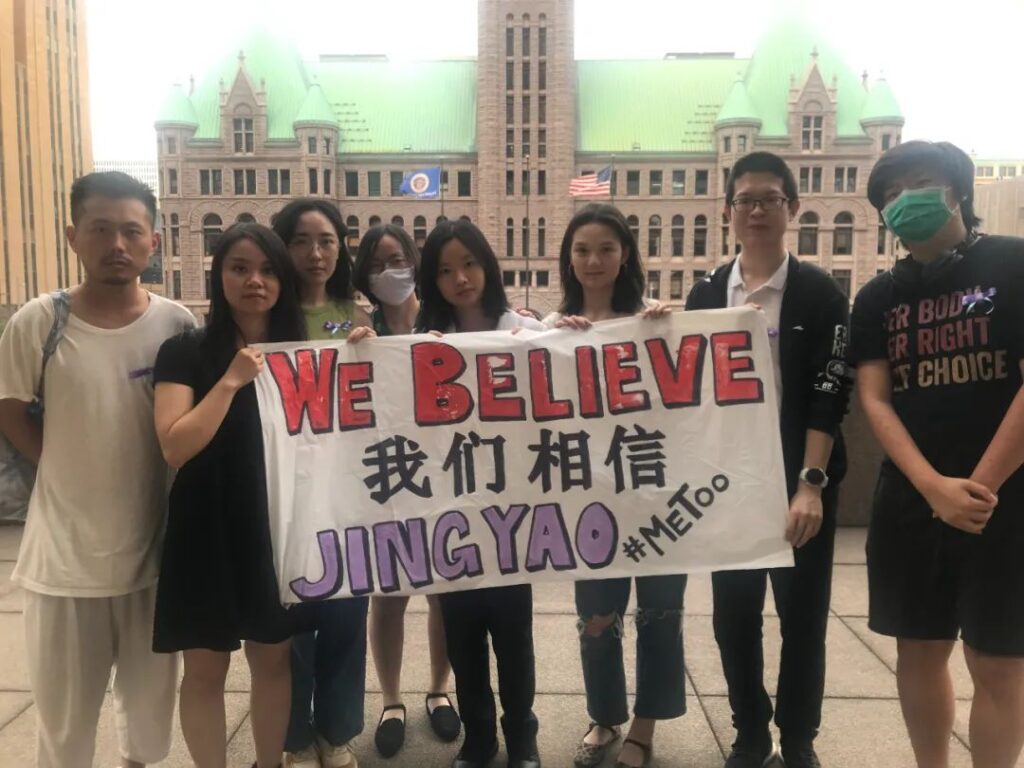
Wuyi Sentenced to Eight Months for “Picking Quarrels”
Wuyi (乌衣) was one of the citizen bloggers who travelled to Feng County, Jiangsu in February to visit the “Chained Woman,” only to be turned away at the hospital and detained by local police for allegedly “picking quarrels.” (See our February news highlights for details.) After being interrogated for several days and then released, she returned home to Anhui and blogged about the experience, only to be detained again in early March. Since then she has remained in custody. Finally in late June it was revealed that she had been been convicted of “picking quarrels” and sentenced to “at least eight months” (八个月起) in prison.
CCP composition shows continued decline of workers and farmers
On the last day of June, the Organization Department of CCP published the latest statistics about members composition. Here’s a few graphs for latest trends:
First, the growth rate leapt out of bottom since 2017, same year when the 19th Congress of CCP was held. However, it is still questionable whether the rate should meet previous peak in 2012.
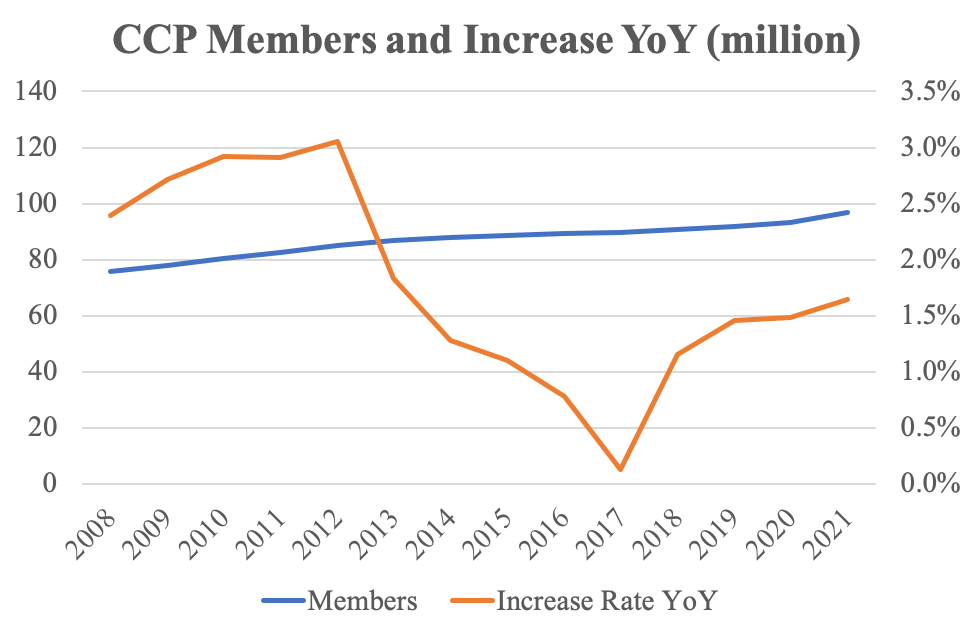
Second, workers and farmers are in a constant trend of decrease in their portion of CCP members, while managers, specialists and retirees have one of increase. While retirees’ increase is partly due to the demographic change, “middle class” rise in CCP composition shows the actual quality of the largest “communist” party.
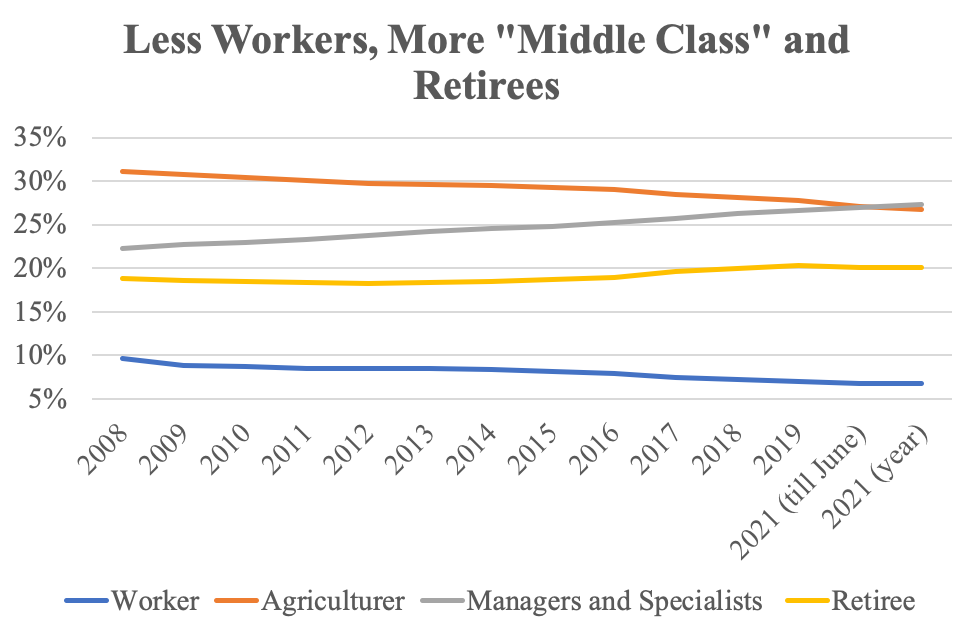
Third, the portion of those above 60-year-old keeps increasing and become prevalent since 2017, same year when the growth rate of CCP members reversed the downtrend. While the group of less-than-36 is in fluctuation – meaning theoretically it could meet another rise should conditions meet – the other two groups have met a more decisive downfall. That is to say, the main driving force of CCP’s growth nowadays are from two groups of population in two poles: the youngest and the eldest.
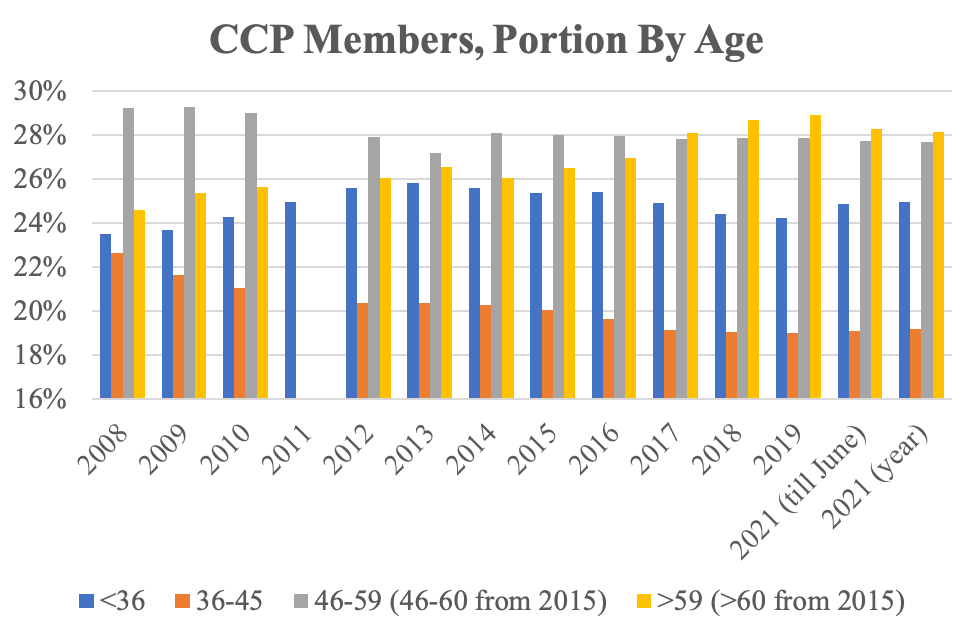
Recent English Publications
Analysing China’s COVID response
Review of our book Social Contagion and other material on microbiological class war in China, by MLR (summer 2022)
‘I’m Very Anxious’: China’s Lockdowns Leave Millions Out of Work
“Migrant workers and recent college graduates have been hit hardest by shuttered factories, closed construction sites and an anemic job market.” (NYT, May 5, paywalled)
Xi Jinping sends warning to anyone who questions China’s zero-Covid policy
“China’s top leader Xi Jinping has issued the strongest warning yet against anyone who questions the country’s zero-Covid policy, as stringent, frequent lockdowns fuel public discontent and deal a devastating blow to the Chinese economy.” (SCMP, May 6)
Ten New Stadiums That Will Not Be Used for the 2023 Asia Cup
“On Weibo, one popular post listed ten stadiums that were renovated or newly built to host the 2023 Asia Cup, adding the alleged (staggering) construction/renovation costs.

1. Xiamen Bailu Stadium: costs 3.5 billion [$515.5 million].
2. Qingdao Youth Football Stadium: costs 3.2 billion [$470 million].
3. Chongqing Longxing Stadium: costs 2.7 billion [$397.7 million].
4. Xi’an International Football Center: costs 2.395 billion [$352.7 million].
5. Dalian Suoyuwan Football Stadium: costs 1.88 billion [$277 million].
6. Chengdu Phoenix Hill Stadium: costs 1.865 billion [$274.7 million].
7. SAIC Motor Pudong Arena: costs 1.807 billion [$266 million].
8. Suzhou Kunshan Football Stadium: costs 1.6 billion [$235.6 million].
9. Tianjin Binhai Football Stadium: the renovation cost 320 million [$47 million].
10. New Beijing Gongti Stadium: renovation cost 280 million [$41.2 million].”
(What’s on Weibo, May 15)
China’s economy skids as lockdowns hit factories, retailers
Michael Pettis’ thread responding to this is worth a read:
‘We are the last generation’: China’s harsh lockdowns could exacerbate population crisis
‘”If you don’t obey the orders from the city government, you will be punished, and the punishment will affect three generations in your family,” the hazmat-suited police officer said, pointing his finger at the camera in a video posted on Chinese social media. “We are the last generation, thank you,” a young man, who is not seen in the video, replied adamantly, in an apparent suggestion he is not planning to have any kids. The video ended there, with no indication of whether the family was eventually taken away. But it spread like wildfire on China’s internet, resonating with many young Chinese who are fed up with the increasing pressure on them to have children — from a society and government that many say has provided them with little of the material and emotional security they need to raise a child.’ (CNN, May 16)
Also see: “We’re the Last Generation” Becomes a Slogan For China’s Disenchanted (CDT, May 17)
How China’s zero-Covid policy is tipping the world into recession
Ignoring the title (the global economy has been in crisis for years, and even this particular manifestation was not simply “caused” by China’s zero-covid policy), this article suggests some interesting possibilities:
‘While reduced Chinese demand for commodities might ease inflationary pressure, the supply chain disruption will more than offset that and keep up the pressure on major central banks to continue raising interest rates into a recession. The world remains on a dual track of real economy inflation and asset deflation…. If one looks through the prism of an inevitable conflict between China and the US, many things start to make sense. What is happening could be seen as a trial run for managing a wartime society and economy. If businesses and individuals can maintain their loyalty this time, they would be more likely to stick around in the event of a war.’ (SCMP, May 16)
More Pettis on property sector in response to SCMP article “China’s property crisis”
The faces from China’s Uyghur detention camps
“Thousands of photographs from the heart of China’s highly secretive system of mass incarceration in Xinjiang, as well as a shoot-to-kill policy for those who try to escape, are among a huge cache of data hacked from police computer servers in the region. The Xinjiang Police Files, as they’re being called, were passed to the BBC earlier this year. After a months-long effort to investigate and authenticate them, they can be shown to offer significant new insights into the internment of the region’s Uyghurs and other Turkic minorities.” (BBC, May 24)
China’s economy in battle to keep growing, says premier
“Li added that the economy was “to some degree worse than” it had been at the start of the pandemic in early 2020, noting that unemployment for people aged 16 to 24 had reached a historic high of 18.2 per cent while the jobless rate for migrant workers was also up sharply.” (FT, May 25, paywalled but reposted on Nikkei Asia)
Dawn Wong arrested & forced to remove satirical videos from YouTube about Shanghai lockdown
“After she posted “Alison Fake News #2″, the Shanghai police arrested @王天小天王 (Dawn Wong). They released her, but made her remove the videos from Weibo and YouTube.”
【CDTV】上海警方与Dawn Wong通力合作让《爱丽森假新闻》趋于完美
Chang Che on Wang Huning: The Mind behind Xi & the Modern CCP
‘We discuss Wang’s role in crafting China’s authoritarianism to implement capitalist reforms, how Wang’s writings convinced party leaders that America would ultimately collapse, the current state of Nihilism in both the US and China amongst young people, and the contrasting legacy of China’s ‘Covid-Zero’ and America’s “Covid for Everyone”.’ (Arts of Travel, May 22)
Millions of China’s Migrant Workers Find Themselves Shunned in Old Age
“The Shuitun job fair on the outskirts of Beijing was bustling with job seekers even before the crack of dawn one April morning. Like many other job markets offering short-term employment across Beijing, it was packed with seniors. Mostly men, slightly hunched, dressed in dark clothes and trousers. They carried canvas bags with an assortment of tools, shovels, measuring rulers and gloves. Women dressed more brightly. All had tanned faces, which were coarse and wrinkled. Their hands revealed years of toil: thick knuckles, hardened palms.” (Caixin, June 1, paywalled)
Covid-19 controls eased after protest in commuter town near Beijing
“Chinese authorities have apparently eased restrictions on a commuter town near Beijing after the latest show of public anger against Covid-19 controls. Thousands of residents gathered in Yanjiao, Hebei province on Wednesday to protest over measures that have made it difficult for them to enter Beijing in the past two years.” (SCMP, June 2)
Chinese Developer Accepts Wheat, Garlic as Payment to Woo Buyers
“As China’s property slump persists, one developer is trying to entice farmers to buy homes by accepting their crops as payment. Central China Real Estate Ltd. is offering to pay farmers as much as 160,000 yuan ($24,000) for their wheat to offset down payments for homes in its River Mansion residential project in Shangqiu, a city in Henan province.” (Bloomberg, June 21)
China’s ‘Zero COVID’ Measures Are Taking a Toll on Gig Workers
“In the words of one exhausted driver about the regulations imposed by the authorities, “What can we possibly do? Those are other people’s regulations.” While the admission may seem like a simple acknowledgment of fatigue, it underlines the loss of autonomy that many laborers feel in relation to management and Chinese authorities. Their objection is not so much to policy decisions that they themselves have little control over, but rules made by people who don’t understand the consequences they have.” (Rui Zhong for WPR, June 22)
Previous Monthly News Highlights
Struggling to Survive in Shanghai and Beyond: News Highlights, April 2022
Controlling the Soul’s Thirst for Freedom: News Highlights, March 2022
Chains of Patriarchy, Death from Overwork, Silenced Critics of War: News Highlights, February 2022
Drinking Algae, Folding Beijing, Fighting Lockdowns: News Highlights, January 2022
Fake Capital, Persecuted Speculators & Exploited Enterprises: News Highlights, December 2021
Notes

